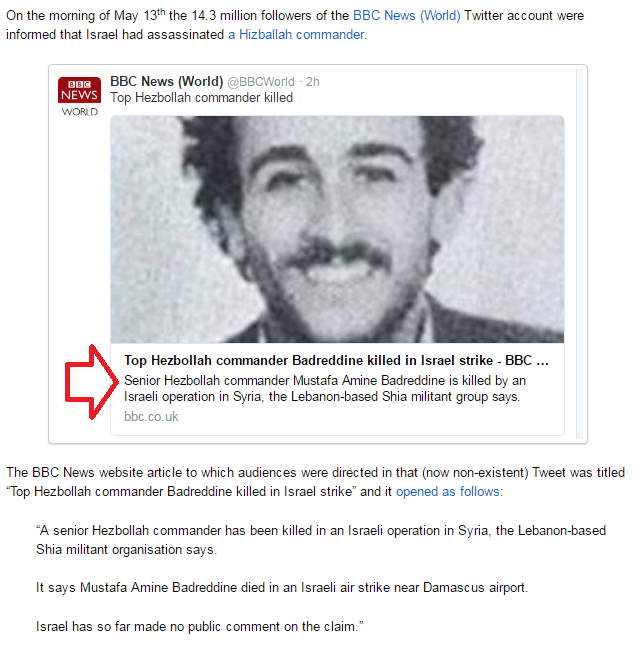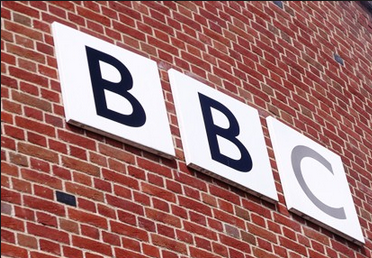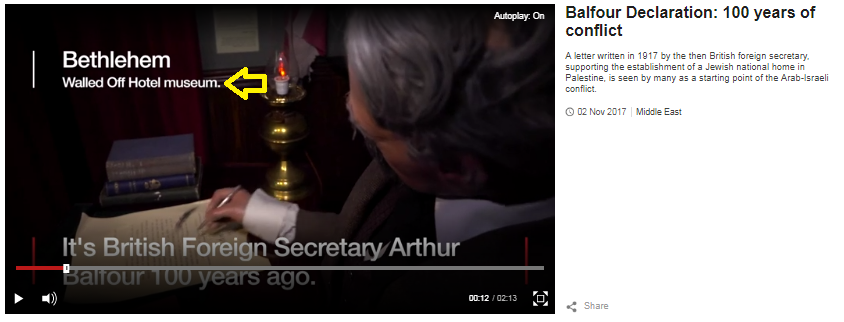As was documented here back in May 2016:

As was noted here at the time, although that information did not in fact come from Hizballah, subsequent versions of the BBC’s report inaccurately told readers that the terror group had “rolled back” the claim.
Nevertheless, the final version of the article – which is still available on the BBC News website – points BBC audiences towards the assumption that Israel may have been responsible for the killing.
“An initial report by Lebanon’s al-Mayadeen TV said that Badreddine, 55, died in an Israeli air strike. But a later statement by Hezbollah on al-Manar’s website did not mention Israel.
Israeli media reported that the government refused to comment on whether it was involved in Badreddine’s death.
Israel has been accused by Hezbollah of killing a number of its fighters in Syria since the conflict began.”
And – under the sub-heading “Key questions”:
“Who could have killed Mustafa Badreddine?
Any of the armed groups seeking to overthrow Mr Assad might have sought to kill the man co-ordinating Hezbollah military activities. However, suspicion is likely to fall on Israel, which fought a war against Hezbollah in 2006.
Israel has been accused of killing several of the group’s leaders over the years, although it has never officially confirmed its involvement.
Hezbollah military chief Imad Mughniyeh was killed in a car bombing in Damascus in 2008 that US intelligence officials said last year was a joint operation by the CIA and Israel’s Mossad spy agency.
In January 2015, a suspected Israeli air strike in the Syrian Golan Heights killed six Hezbollah fighters, including Mughniyeh’s son Jihad, and an Iranian Revolutionary Guards general.
And in December, Hezbollah said one of its senior figures, Samir Qantar, was killed when missiles fired by Israeli jets struck a block of flats in Damascus.
Israel has also reportedly conducted air strikes aimed at preventing advanced weapons shipments from Iran from reaching Hezbollah via Syria.”
On March 8th 2017 the Israeli news website Walla reported that an investigation by Al Arabia suggests a different answer to the question “who could have killed Mustafa Badreddine?” than the one promoted by the BBC.
“According to an investigation by the ‘Al Arabia’ network, the General Secretary of the organisation [Hizballah – Nasrallah], together with the commander of the Iranian Quds Force [Soleimani], planned the assassination of the organisation’s senior figure [Badreddine], who died in a ‘mysterious explosion’ at Damascus airport. Hizballah blamed the Syrian opposition – which in turn blamed Hizballah.”
Whether or not that allegation is true is unclear but Al Arabia’s report is certainly no less reliable that the one from Al Mayadeen claiming that Badreddine had been killed by an Israeli airstrike which the BBC elected to amplify without independently confirming the claim.
As we know, the BBC relates to its online content as “historical record”:
“Our online news is far more accessible today than the newspaper archives of libraries. But in principle there is no difference between them: both are historical records. Fundamentally it is in the public interest to retain them intact.”
Given that, we would of course now expect to see the BBC revisiting this story, reviewing its steering of audiences towards the default conclusion that Israel was likely to have been involved and checking the accuracy of this particular example of “historical record”.




